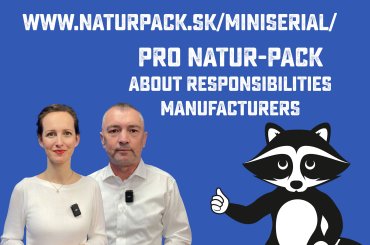If you are interested to see the results of the community project “Bag by bag: Let us clean-up the forests Pečniansky les, Soví les and hrabiny” and the outputs of the analyses of collected waste, read the press release of the VÚB Bank and watch also the reportage on YouTube channel NATUR-PACK for public.
VÚB bank press release – 14 July 2021 - Bratislava
A large joint cleaning event of the Bratislava City Hall and the volunteers from VÚB Bank relieved the flood-plain forests on the right bank of Danube river by 340 kg of waste. In addition to a cleaner nature in the protected forest area also analysis of collected and separated waste resulted from this activity. It was organized by the company NATUR-PACK, and the outputs will serve to the municipality as an overview of the situation with pollution in the highly valuable sites, as well as data in relation to the necessary adjustment of rules for depositing of the beverage packaging.
Bratislava citizens who are aware of the nature protection and cleanliness could combine the pleasure of walking in the Danube bank forests with useful activity. Thank to the VÚB Bank initiative the information boards were installed in several sites of the right river bank and they were equipped with gloves, bags and points reserved for handing-over of the collected waste. In the framework of the largest event of a kind in the flood-plain forest area in Bratislava, 340 kg of waste were collected during 10 days in three forest segments (“Pečniansky forest” – behind Lanfranconi bridge, “Owl forest” - between Apollo bridge and University of Economics, and “Hrabiny forest” – behind University of Economics and Danube).
„Clean-up of the natural sites where illegal dump-sites appeared massively during last years was opened for the broad public. I would like to thank on behalf of the municipality to all who added hands to the joint work and who contributed by each bag of collected waste. First of all to the volunteer teams from VÚB Bank who stay behind the idea itself and who organized the entire activity from personnel, but also material point of view. We are pleased that we helped the forest having a great importance for Bratislava thank to its biodiversity. We are prepared to organize similar activities also in the future,” explained Andrej Kovarik, Bratislava Mayor representative for the environment.
Removal of waste from the forest was certainly the primary aim of the activity, however, the organizers were also interested in further waste separation and analysis. After collection and transport of bags from the collection points performed by the municipal organization OLO, approximately one third of the collected waste underwent physical examination and statistical analysis. Up to 86 % of waste volume was represented by separable components which can be recycled or treated in an environmentally friendly manner, and which would pollute the urban forests during following decades unless the clean-up intervention.
Among the waste belonging to the containers or bags for the separated collection the highest proportion – 18 percent – belongs to plastic. The highest proportion among all plastic waste belongs to PET bottles – nearly one third (29 %). High volume waste that should be handed over to the collection yards or to high-volume containers regularly available in the individual city districts reached 28 % of collected waste. Waste containing different dangerous substances were also detected, and their presence in the protected areas is not acceptable.
„When we observed all the waste piles sorted according to the individual types we realized that practically all what we use in our households on a daily basis can end up in the nature – from food, textiles, glass, paper, metals, plastic, many types of dangerous chemicals to various electric and electronic waste and construction materials,” says Marek Brinzík from the company NATUR-PACK which managed the separation and analyses of the waste from Bratislava forest, and he adds: “The analysis of collected waste confirmed our opinion. If we wish to have really clean nature, the foreseen disappearance of PET bottles and cans thank to depositing will not be sufficient. PET bottles, similarly as cans reached 5 % each out of nearly 100 kg of analyzed summary sample. If not a single reusable packaging would get into nature after launching and running of the deposition system, high volume of other waste types would still appear there (90 % in our case). Depositing will certainly help the nature cleanliness to a great extent, nevertheless, another activities towards increased public awareness on waste issues will further be highly needed. We believe that less and less waste will end up in the nature. That is why we highly appreciate every single project that helps to achieve this goal."


